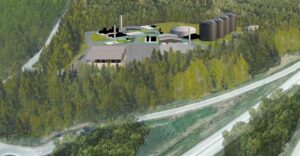Gasum plans a large-scale biogas plant in Hörby, Sweden

Gasum is planning five modern large-scale biogas plants in Sweden to be constructed in the coming years.
Two of the planned plants are already under construction.
The first plant in Götene, some 150 km Northeast of Gothenburg, will be starting commercial production at the end of 2024.
The second one in Borlänge, approximately 200 km Northwest of Stockholm, received a final investment decision at the beginning of 2024 and onsite work is beginning.
The next plant will be located in Hörby, in Southern Sweden about 50 km Northeast of Malmö.
Planning is proceeding at pace, as most design solutions are already being tried and tested in the Götene and Borlänge projects.
Each site is, of course, unique regarding the conditions and regional characteristics, said Tor Husebø, vice president, projects & biogas production at Gasum.
“Hörby is located in the Skåne region, which is characterised by a high density of agriculture and livestock farms. This means that there is an abundance of manure and other agricultural residues that can be used to produce biogas, and correspondingly, biogas production can reduce the climate impact of agriculture in the region.
"We have a very good relationship with the Hörby municipality, which has a positive outlook on Gasum's planned project – our cooperation in developing the land use plan is working very well,” added Husebø.
The majority of the raw materials will consist of residual products and waste from the agricultural sector.
This means solid and liquid manure from farm animals, grain and silage.
In addition to biogas, the plant will produce yearly up to 480 000 tons of high-quality recycled biofertilisers that will be returned to the surrounding farm fields for growing crops.
Gasum has not yet made the final investment decision, but the planning process is firmly proceeding to secure all necessary permits and the land use plan with the municipality.
Like the other five plants, the Hörby plant project has been granted funding from the Swedish Environmental Protection Agency’s Klimatklivet investment programme.
“If everything goes as planned, the plant will start producing 133 GWh of biomethane per year from the end of 2026. That means a substantial reduction in carbon dioxide emissions that is enabled by using biogas instead of fossil fuels,” said Tor Husebø.
Gasum’s strategic goal is to bring seven terawatt hours (7 TWh) of renewable gas yearly to the Nordic market by 2027.
















